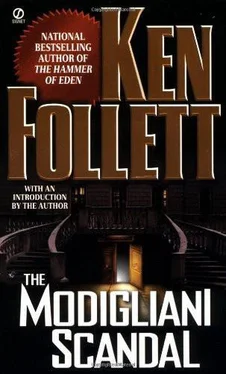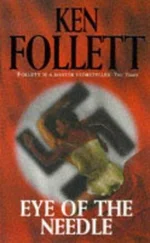″Fifty percent?″ Tom said. Wright put a restraining hand on his arm.
″Leave it, Tom. Mandingo′s taking the big risk—storage.″
Mandingo spoke as if he hadn′t heard. ʺThereʹs something else. You′re asking me to put my men at risk, lay out money, find storage—even just talking to you I lay myself open to a conspiracy charge. So don′t do the job unless you′re absolutely certain. If you cock it up—well, just leave the country before I get my hands on you. Failures are bad for my reputation.″
Wright stood up, and Tom followed suit. Mandingo showed them to the door.
He said: ʺHey, Tom, whatʹs your in to that house?″
″I′m going there to dinner. See you.″
Mandingo laughed uproariously as he shut the door.
PART FOUR
The Varnish
″I think I know what it is like to be God.″
PABLO PICASSO,
dead painter
I
THE REPORTER SAT AT his desk in the newsroom, thinking about his career. He had nothing better to do because it was Wednesday, and all decisions made by his superiors on Wednesday were reversed on Thursday morning; therefore he had adopted a policy of never actually working on Wednesdays. Besides, his career offered much food for thought.
It had been a short and spectacular one, but there was little substance beneath the glittering surface. He had joined a small weekly in South London after leaving Oxford, then he had worked for a news agency, then he had managed to get this job on a quality Sunday paper. It had taken him less than five years.
That was the glitter: the dross was that it had been worthless. He had always wanted to be an art critic. That was why he had suffered the weekly in order to learn his trade, and put up with the agency in order to prove his competence. But now, after three months on the Sunday paper, he had realized that he was at the end of a very long queue for the art critic′s comfortable chair. There seemed to be no more shortcuts.
The story he was to do this week involved pollution of a reservoir in South Wales. Today, if anyone asked, he was making preliminary inquiries. Tomorrow the pollution story would have shifted to a beach on the Sussex coast, or something. Whatever happened the job had not the remotest connection with art.
A fat file of newspaper clippings in front of him was marked: ʺWater—Pollution—Reservoirs.ʺ He was reaching to open it when the phone rang. He diverted his hand to the receiver.
″Newsdesk.″
″Have you got a pencil ready?″
Louis Broom frowned. He had taken many crank phone calls in five years of journalism, but this approach was a new one. He opened the desk drawer and took out a ballpoint and a pad.
″Yes. What can I do for you?″
The answer was another question. ″Do you know anything about art?″
Louis frowned again. The man did not sound much like a crank. The voice was steady and unhysterical, and there was none of the breathless intensity which normally characterized screwball telephoners.
″As it happens, I do.″
″Good. Listen carefully, because I won′t repeat anything. The biggest fraud in the history of art was perpetrated in London last week.″
Oh dear, thought Louis, it is a crank. ″What is your name, sir?″ he said politely.
″Shut up and make a note. Claypole and Company bought a van Gogh called The Gravedigger for eighty-nine thousand pounds. Crowforth′s bought a Munch titled The High Chair for thirty thousand.″
Louis scribbled frantically as the voice droned a list of ten pictures and galleries.
Finally the voice said: ″The total comes to more than half a million pounds. I′m not asking you to believe me. But you′ll have to check. Then, when you′ve published your story, we will tell you why we did it.″
″Just a minute—ʺ The phone clicked in Louisʹs ear, and he heard the dial tone. He put the receiver down.
He sat back and lit a cigarette while he wondered what to do about the call. It certainly could not be ignored. Louis was 99 percent sure the caller was a nutcase: but it was by following up the onepercenters that great exclusives were found.
He debated telling the news editor. If he did, he would probably be told to pass the tip to the art critic. Much better to make a start on the story first, if only to establish his own claim to it.
He looked up Claypole in the directory and dialed the number.
″Do you have a van Gogh called The Gravedigger for sale?″
″Just a moment, sir, and I will find out.″
Louis used the pause to light another cigarette.
″Hello? Yes, we do have that work.″
″Would you tell me the price?″
″A hundred and six thousand guineas.″
ʺThank you.ʺ
Louis rang Crowforth & Co. and found that they did indeed have a Munch called The High Chair for sale at 39,000 guineas.
He began to think hard. The story was standing up. But it was not yet time to talk about the story.
He picked up the phone and dialed another number.
Professor Peder Schmidt hobbled into the bar on his crutch. He was a big, energetic man with blond hair and a red face. Despite a slight speech impediment and an atrocious German accent, he had been one of the best art lecturers at Oxford. Although Louis had studied English, he had attended all of Schmidt′s lectures for the pleasure of the man′s grasp of art history and his enthusiastic, iconoclastic theories. The two men had met outside the lecture theater, gone drinking together, and argued fiercely about the subject closest to their hearts.
Schmidt knew more about van Gogh than any other man alive.
He spotted Louis, waved, and came over.
ʺThe spring on your bloody crutch still squeaks,″ Louis said.
″Then you can oil it with whisky,″ Schmidt replied. ″How are you, Louis? And what is all this secrecy about?″
Louis ordered a large scotch for the professor. ″I was lucky to catch you in London.″
″You were. Next week I go to Berlin. Everything is hurry and chaos.″
″It was good of you to come.″
″It was indeed. Now what is this about?″
″I want you to look at a picture.″
Schmidt downed his scotch. ″I hope it′s a good one.″
ʺThatʹs what I want you to tell me. Let′s go.″
They left the bar and walked toward Claypole′s. The shopping crowds on the West End sidewalks stared at the odd couple: the young man in his brown chalk-stripe suit and high-heeled shoes, and the tall cripple striding along beside him, wearing an open-necked blue shirt and a faded denim jacket. They went along Piccadilly and turned south to St. James′s. In between an exclusive hatter′s and a French restaurant were the leaded bow windows of Claypole′s.
They went in and walked the length of the small gallery. At the far end, under a spotlight of its own, they found The Gravedigger.
To Louis it was unmistakably a van Gogh. The heavy limbs and tired face of the peasant, the flat Dutch countryside, and the lowering sky were the trademarks. And there was the signature.
″Professor Schmidt! This is an unexpected pleasure.″
Louis turned to see a slight, elegant man with a graying Vandyke beard, wearing a black suit. Schmidt said: ″Hello, Claypole.″
Claypole stood beside them, looking at the picture. ″Something of a discovery, this one, you know,″ he said. ″A wonderful picture, but quite new to the market.″
ʺTell me, Claypole, where did you get it?″ Schmidt asked.
″I′m not sure I should tell you. Professional secrets, you know.″
″You tell me where you got it and I will tell you what it is worth.″
″Oh, very well. It was a piece of good fortune, really. Chap called Renalle, from a minor agency in Nancy, was over here last week. Staying at the Hilton and disposing of quite a large collection from the estate of some industrialist or other. Anyway, he simply offered me the picture first.″
Читать дальше












